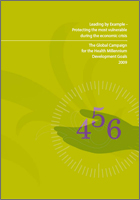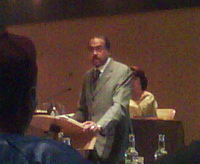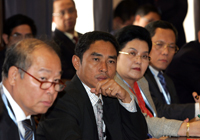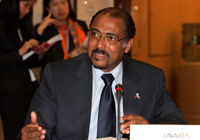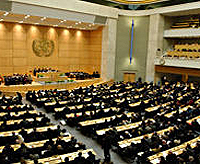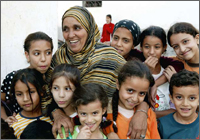
A short report by UNAIDS on AIDS and Global Health examines the role that the health sector should play in helping to attain the goal of universal access to HIV prevention, treatment, care and support. Credit: UNAIDS/P.Virot
The High-Level Forum on Advancing Global Health in the Face of Crisis is taking place at United Nations Headquarters on Monday, 15 June 2009. The Secretary-General is hosting the day long forum in order to elevate the global health debate and engage multisectoral representatives from around the world.
A short report by UNAIDS on AIDS and Global Health made available for this event examines the role that the health sector should play in helping to attain the goal of universal access to HIV prevention, treatment, care and support. Over the past decade the AIDS response has played a major role in producing better health outcomes for people in developing countries and has mobilized a whole range of stakeholders in efforts to build health systems worldwide. However, much work still needs to be done.
The AIDS epidemic is part of the global health landscape, just as the global health agenda is part of the AIDS response. The new report shows that the response to AIDS is an opportunity to improve health systems worldwide. Also discussed is that other areas that contribute to health solutions, such as human rights, the law and education, need to be embraced if we are to maximize outcomes, and that health equity must be addressed.
Shortfall in health resources
Investment in global health has increased significantly in recent years, and investment in the AIDS response has grown from US$ 300 million in 1996 to nearly US$ 14 billion in 2007. However, resources are still falling short for all health needs, and AIDS is no exception. With 7400 new HIV infections each day, the shortfall grows ever greater, and to achieve universal access in 2010 will require US$ 25 billion: US$ 11 billion more than is available today. Advocates for global health must therefore find ways to increase sound investments in health and the AIDS response.
Community services strengthened
It has been shown that there are many beneficial effects from an increase in AIDS resources being spent on health and community systems. A case study described in the report looks at how increased funding for HIV in Nigeria has trickled down to improvements at the local level in a whole range of areas, which in turn helps in the fight against many other diseases. Focusing on a hospital in Jengre, Nigeria, the case study shows that AIDS funding has helped provide free services for children and pregnant mothers enrolled in antenatal care, in addition to enabling major improvements in the hospital’s infrastructure and its ability to tackle the other poverty diseases: tuberculosis and malaria.
Linking AIDS treatment and HIV prevention to other health issues, such as sexual reproductive health, tuberculosis and safe motherhood, has meant that they themselves receive more attention. AIDS responses have also strengthened hospital infection control and improved blood safety and transfusions. The issue of paediatric AIDS has contributed to the debate on better medicines for children, and new opportunities have emerged to challenge those social norms that contribute to ill health.
HIV: health issue and social issue
AIDS and global health notes that HIV is both a health issue and a social issue. By involving the education, agriculture, business, media, labour and other social service sectors, the AIDS response has been able to leverage better health outcomes, just as efforts to eradicate polio and reduce tobacco use have done in recent years. HIV has highlighted the underlying causes of poor health: social determinants such as gender inequality, stigma, migration and lack of education. A lesson learned is that social determinants must be addressed when addressing global health needs.
Sections of the report on tuberculosis and HIV, climate change and HIV and A (H1N1) influenza stress the diverse areas that global health and AIDS cut across.
In conclusion, the report reminds us that much has been accomplished under the emergency conditions of the past 25 years, but that the global response is at a crossroads. The AIDS response and the health response should not work in isolation, but should be united around one common goal: results for people.




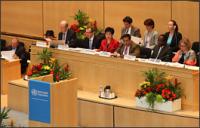


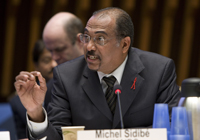
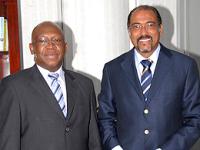 (from right) Executive Secretary of the UN Economic Commission for Africa Mr Abdoulei Janneh and Executive Director of UNAIDS Michel Sidibé, 9 November 2009.
(from right) Executive Secretary of the UN Economic Commission for Africa Mr Abdoulei Janneh and Executive Director of UNAIDS Michel Sidibé, 9 November 2009. 
 ECOSOC events are organized in the Economic and Social Council Chamber.
ECOSOC events are organized in the Economic and Social Council Chamber.